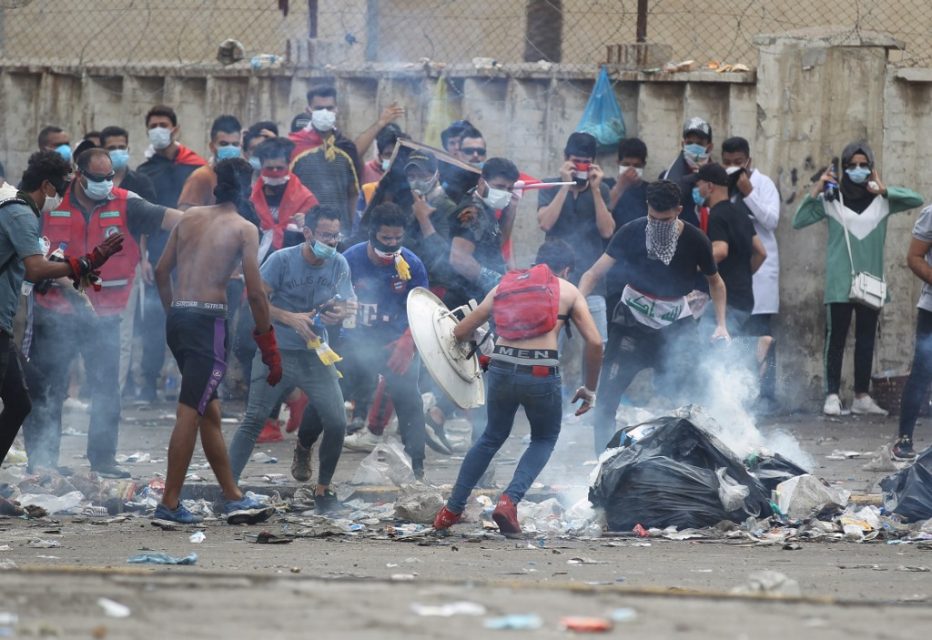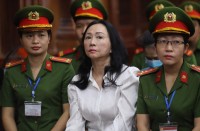
BAGHDAD, Iraq (AFP) — Iraqi students joined anti-government protests in Baghdad on Sunday, ramping up the street pressure on Prime Minister Adel Abdel Mahdi who also faced a sit-in and the first resignations from parliament.
The capital and country’s south have been rocked by a second wave of demonstrations since Thursday, with protesters digging in despite tear gas, curfews, and violence that has left more than 70 dead.
About a dozen schools and universities decided to shut their doors, activists said Sunday, with some protesting on campus and others heading towards the main gathering spaces for rallies.
In the emblematic Tahrir Square, young girls in school uniforms with rucksacks were seen trekking through streets littered with tear gas canisters.
Later in the day, a spokesman for the prime minister threatened that any further disruption to schools would earn protesters “severe punishment.”
Protesters clung onto Tahrir throughout the day, defying heavy tear gas use and pledging to “weed out” the political class.
“We’re here to bring down the whole government — to weed them all out!” one protester said, the Iraqi tricolor wrapped around his head.
The protests are unprecedented in recent Iraqi history for their ire at the entire political class, including Abdel Mahdi, parliament speaker Mohammed Al-Halbussi and even traditionally revered religious leaders.
They have also been exceptionally violent, with 157 dead in the first set of rallies and 74 dead in the latest round.
“We don’t want a single one of them. Not Halbussi, not Abdel Mahdi. We want to bring down the regime,” the protester said.
First MPs resign
Renewed protests also flooded the streets of Najaf, Hilla, Karbala, and Diwaniyah in the south.
In the oil-rich port city of Basra, police enforced a strict curfew and said it arrested “saboteurs” who had infiltrated the protesters.
This week’s demonstrations are the sequel to six days of anti-government rallies that erupted on October 1.
Sparked by outrage at corruption, unemployment and poor services, they evolved into demands for an overhaul of the political system and a new constitution.
On Sunday, Iraqi President Barham Saleh met with the United Nations’ top representative in the country Jeanine Hennis-Plasschaert to discuss electoral reform and amendments to the constitution, which dates back to 2005.
Abdel Mahdi has also proposed a laundry list of reforms including hiring drives, increased pensions and promises to root out corruption.
Oil-rich Iraq is the OPEC oil cartel’s second-biggest producer, but one in five people live in poverty and youth unemployment stands at 25 percent, according to the World Bank.
Beyond the street, Abdel Mahdi also faces new pressure from parliament, with four MPs resigning and the largest bloc holding an open-ended sit-in since Saturday night.
Parliament’s only two Communist MPs and two lawmakers linked to former premier Haider al-Abadi announced they were stepping down late Sunday.
“We are resigning because of the protests and the way they were repressed,” Communist lawmaker Raed Fahmy told AFP.
The Iraqi Communist Party had allied with firebrand cleric Moqtada al-Sadr in the 2018 elections to form Saeroon, which on Saturday began a sit-in to back protests.
The move has left Abdel Mahdi more squeezed than ever, as Saeroon was one of the two main sponsors of his government.
Sadr speaks
The other was Fatah, the political arm of the Hashed al-Shaabi paramilitary force which said it would continue to back the central government.
The one-time allies now find themselves on opposite sides of the protest movement.
The Hashed was founded in 2014 to fight the Islamic State group but its factions have since been ordered to incorporate into state security services.
Several of their offices have been torched in recent days in southern Iraqi cities, hinting at a new violent phase.
Dozens of protesters have died while storming or setting fire to the offices of Asaib Ahl al-Haq, the Badr Organisation and others, according to medics and police.
Hashed commanders have threatened revenge, and its second-in-command Abu Mahdi al-Muhandis said Sunday his force “is ready to stand against discord”.
But Sadr answered on Sunday night in his first tweet since protests resumed this week, directly addressing the Hashed.
“Do not champion the corrupt. Do not repress the people,” he warned.
The UN has warned, “armed spoilers” could derail efforts at peaceful protests in Iraq, saying it was “tragic” to see renewed violence in the country.
Most of those killed since Thursday have been shot in the Shiite-majority south, but medics and protesters in the capital have reported trauma wounds from tear gas canisters.
On Sunday, security forces were positioned on the edges of Tahrir, while elite Counter-Terrorism Service troops and armored vehicles were seen in surrounding districts.
The CTS said it had deployed its units to “protect vital infrastructure,” and its forces were not seen in Tahrir.
© Agence France-Presse





